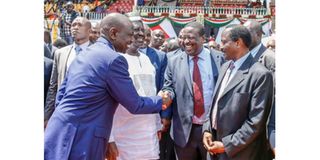Gender agenda: What State House contenders have promised

DP WIlliam Ruto, former Prime Minister Raila Odinga and former vice presidents Musalia Mudavadi and Kalonzo Musyoka on Mashujaa Day in Kakamega in 2018. The presidential hopefuls have been making promises on how to tackle gender disparity.
What you need to know:
- Governance expert Aluoch says women’s perception of leadership has improved in recent years and they are starting to hold politicians to account, hence political parties cannot exclude gender matters from their campaigns.
- Gender expert Winfred Lichuma says politicians are making mere promises as they have failed numerous times to lobby their members to support gender law enactment.
We are in the era of Generation Equality and as per the Sustainable Development Goals, commitments made by 193 countries and global leaders are crucial to developing and executing policies to promote inclusive development.
Kenya will certainly have a new president after the August 9 General Election to take over from Mr Uhuru Kenyatta who has undoubtedly left a mark in the gender equality space. We, therefore, look at the four main presidential aspirants and what they have to offer in accelerating the realisation of the fifth SDG on gender equality.
Raila Odinga, ODM leader
Of his 10-pillar development roadmap are promises to enable women to be economic powerhouses, increase access to water and eliminate hunger. His fourth pillar on 'Uchumi kwa Akina Mama' seeks to enable businesswomen to access credit. This proposed policy would also ensure women become owners of crucial assets such as land while paving the way for proportional representation of women in all arms of government. How different this policy would be from the existing ones that cover Women Enterprise Fund or Thamini loan product for the widows is a wait-and-see matter.
With a law yet to be passed to allow the implementation of the two-third gender principle provided for in the Constitution, it remains to be proved whether Mr Odinga would live up to his pledge and ensure the country finally has a law in place.
Under his seventh goal of 'Fukuza Njaa', Mr Odinga would be keen on helping communities adapt to and mitigate effects of climate change to achieve food security. Women bear the brunt of drought, not just because they have to walk for long distances to find water but also because they bear the cost of mental distress when there is no food for their families. How this plan will incorporate the differentiated experiences to help them build resilience against climate shocks will be significant.
Mr Odinga’s eight point is on 'Maji kwa kila Boma'. During the launch of his presidential bid last December, he said: “We shall not allow water scarcity to be an issue in a country like ours where lakes and rivers burst their banks, yet desert nations have found ways to direct every drop to its people for consumption and production.”
If his promise becomes a reality, then women in the rural and arid and semi-arid areas will not spend more than six hours looking for water. Instead, they will spend the time doing income-generating activities.
Musalia Mudavadi, ANC leader
As he dwelt on tackling the runaway public debt, Mr Mudavadi was not categorical on how his tax policies would be gender-responsive or take cognisance of the tax burden on women, especially female-headed households.
When he unveiled his presidential bid on January 23, Mr Mudavadi, however, promised to integrate the women as a vulnerable group in his development agenda.
Under his development blueprint dubbed ‘Uchumi bora, pesa mfukoni,’ he pledged to lead the country back to economic prosperity. As he does so, he has to consider the fact that women make up to 92 per cent of the informal sector labour force and whichever way the economy shapes, women either suffer or benefit the most.
Mr Mudavadi sought to assure Kenyans that during his leadership would make sure the gender rule guaranteed by the Constitution is implemented. He added: “We will genuinely secure women’s 30 per cent opportunities when tendering for business. That is something you can take to the bank.”
William Ruto, Deputy President
He has yet to formally announce his presidential bid but has been making roadside pledges of “leaving no woman behind” during his campaigns across the country.
While on a tour of Kitui last September, he said: “My government will give priority to small business owners, including women and motorbike operators, to access government funding that will expand their businesses.”
Dr Ruto has also promised to a create a kitty for commercial sex workers to start other businesses away from the trade.
Kalonzo Musyoka, Wiper leader
Last November when National Delegates Congress endorsed him to run for the top seat, Mr Musyoka recognised the crucial role of women in development. He said his leadership would be anchored on empowering women socially and economically.
He has also sought the blessings of women to run for President, a signal that in future he would have their interests at heart. Prior to his endorsement, he hosted more than 500 women drawn from 10 counties of Mt Kenya on his Yatta farm in Machakos County who vouched for his bid.
At the forum, Mr Musyoka promised to invest in agriculture and food security. He, however, did not elaborate how such investments would be gender-responsive.
Expert opinion
For experts, however, the presidential contenders are making mere promises.
“There still lacks political goodwill to implement the gender rule. Even after the Judiciary’s advisory that it should be effected, politicians have failed numerous times to lobby their members to support the law,” said Winfred Lichuma, a gender expert and former chairperson of the National Gender and Equality Commission.
Mitchell Aluoch, a governance expert, holds that women’s perception of leadership “has improved in recent years and they are starting to hold politicians to account. Political parties, therefore, cannot exclude gender matters from their campaigns”.
Reporting by Moraa Obiria, Agatha Gichana and Esther Nyandoro




